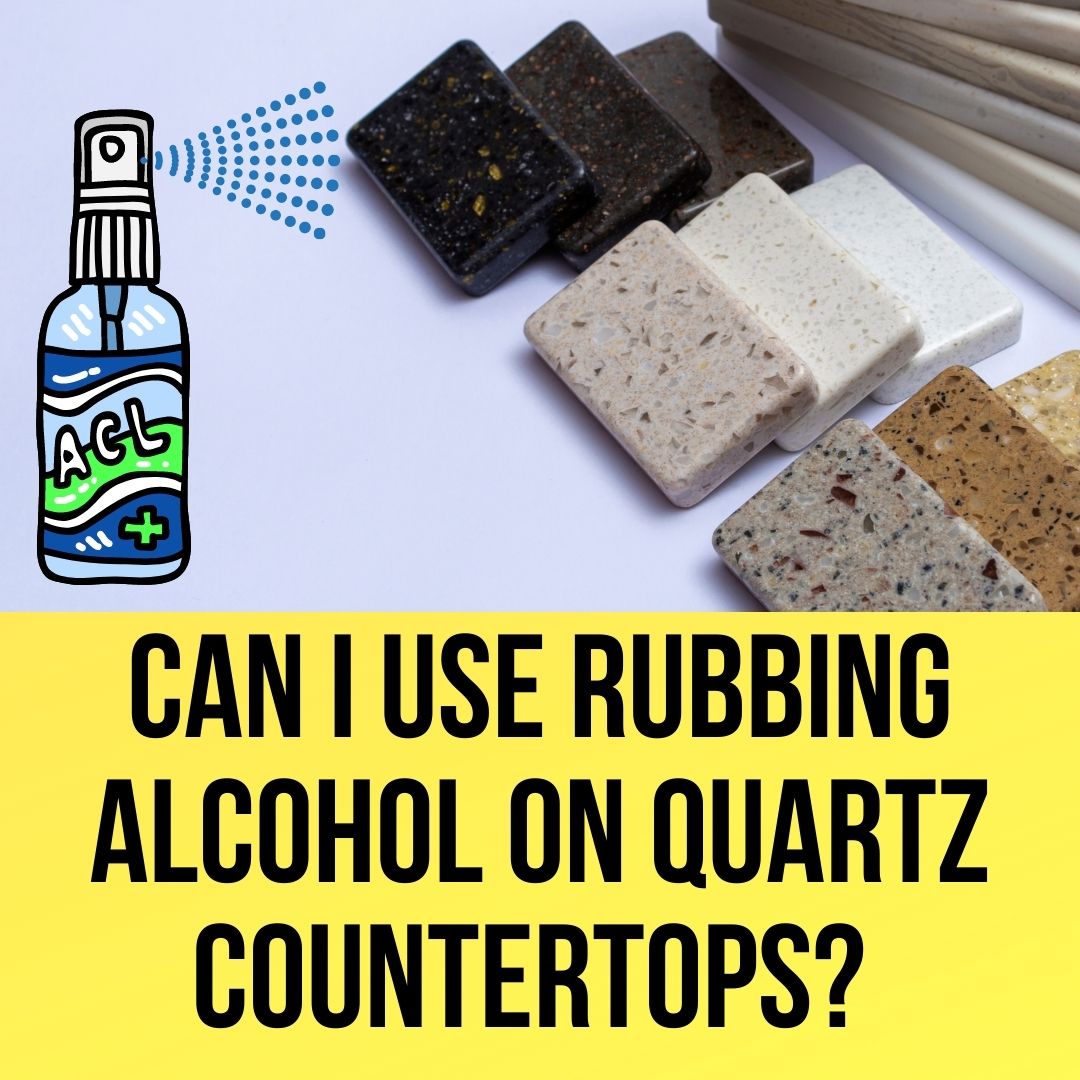
Quartz countertops have gained popularity for their durability, low maintenance, and aesthetic appeal. Homeowners often seek effective and safe cleaning solutions for their quartz surfaces. One common query is whether rubbing alcohol can be used on quartz countertops. In this comprehensive article, we’ll delve into the benefits, potential risks, and best practices for using rubbing alcohol on quartz countertops.
Introduction:
Quartz countertops are engineered stone surfaces composed of quartz crystals and resins. While they are known for being resistant to stains and scratches, maintaining their pristine appearance requires proper cleaning. Rubbing alcohol, also known as isopropyl alcohol, is a versatile cleaning agent, and its application on quartz surfaces is a topic of interest.
Benefits of Using Rubbing Alcohol on Quartz Countertops:
- Stain Removal:
- Rubbing alcohol is effective in removing various stains, including those caused by food, beverages, or cosmetic products. Its solvent properties can dissolve and lift stains from the quartz surface.
- Disinfection:
- Isopropyl alcohol is known for its disinfectant properties. Using it on quartz countertops can help eliminate bacteria and germs, promoting a hygienic environment in food preparation areas.
- Grease and Residue Removal:
- Grease and sticky residues can accumulate on kitchen surfaces. Rubbing alcohol can cut through grease and efficiently remove residue, leaving the quartz countertop clean and polished.
- Quick Evaporation:
- Rubbing alcohol evaporates rapidly, minimizing the time moisture stays on the countertop. This quick-drying characteristic can be advantageous in preventing streaks or watermarks.
Potential Risks and Considerations:
- Sealant Damage:
- Some quartz countertops have sealants or coatings applied during manufacturing. Harsh chemicals, including high concentrations of rubbing alcohol, may compromise these sealants over time. It’s essential to check the manufacturer’s guidelines regarding the use of specific cleaning agents.
- Dryness and Dulling:
- Prolonged or frequent use of rubbing alcohol may lead to the drying out of the quartz surface, potentially causing dullness or loss of luster. Adequate moisturizing and conditioning measures may be necessary.
- Residue Buildup:
- Residue from certain cleaning agents, including rubbing alcohol, may accumulate over time, affecting the appearance of the quartz surface. Thorough rinsing and wiping are crucial to prevent residue buildup.
- Avoiding Abrasive Tools:
- While rubbing alcohol is generally safe for quartz, using abrasive tools or harsh scrubbers in conjunction with alcohol can lead to scratches or damage to the surface. Gentle cleaning tools, such as soft cloths or sponges, are recommended.
Best Practices for Using Rubbing Alcohol on Quartz Countertops:
- Check Manufacturer Guidelines:
- Before using rubbing alcohol or any cleaning agent, review the manufacturer’s guidelines and recommendations for cleaning and maintenance. This ensures compliance with warranty terms and avoids potential damage.
- Dilution for Concentrated Stains:
- For stubborn stains, consider diluting rubbing alcohol with water to reduce its concentration. This helps address specific stains without exposing the quartz surface to excessive amounts of alcohol.
- Thorough Rinsing:
- After using rubbing alcohol, thoroughly rinse the quartz countertop with water to remove any remaining residue. Proper rinsing prevents buildup and maintains the countertop’s appearance.
- Use Soft Cleaning Tools:
- Opt for soft, non-abrasive cleaning tools such as microfiber cloths or soft sponges. Avoid abrasive pads or scouring materials that could scratch the quartz surface.
- Periodic Conditioning:
- To combat potential dryness, consider applying a quartz countertop conditioner periodically. This helps maintain the surface’s shine and protects against dullness caused by repeated cleaning.
Can Isopropyl Alcohol Damage Quartz?
In general, isopropyl alcohol is considered safe for use on quartz countertops. Its properties make it effective for removing stains, grease, and disinfecting surfaces. However, certain considerations should be kept in mind to prevent potential issues:
- Sealant Integrity:
- Some quartz countertops have sealants applied during manufacturing. While isopropyl alcohol is not likely to damage the quartz itself, high concentrations may compromise the integrity of these sealants over time.
- Drying Effects:
- Isopropyl alcohol has drying properties, and repeated use may contribute to dryness of the quartz surface. This can potentially affect the overall appearance and shine.
- Abrasive Tools:
- While isopropyl alcohol is safe, using abrasive tools or harsh scrubbers in conjunction with it can lead to scratches on the quartz surface. Opt for gentle cleaning tools like soft cloths or sponges.
What Should You Not Use on Quartz Countertops?
While quartz is resistant to many household chemicals, it’s advisable to avoid using the following on quartz countertops:
- Harsh Abrasives: Avoid abrasive pads or scouring materials that could scratch the surface.
- Highly Acidic Cleaners: Strong acidic cleaners, such as those with a pH below 7, can damage the resin in quartz countertops over time.
- Bleach or Ammonia-Based Cleaners: These chemicals can affect the color and appearance of the quartz.
How Do You Disinfect Quartz Countertops With IPA?
To effectively disinfect quartz countertops using isopropyl alcohol:
- Clean the Surface: Remove any debris or loose particles using a soft cloth or sponge.
- Apply Isopropyl Alcohol: Dampen a soft cloth or sponge with 70% isopropyl alcohol and wipe down the entire surface.
- Allow to Air Dry: Let the isopropyl alcohol air dry on the countertop. This ensures sufficient contact time for disinfection.
What Other Disinfectant Can You Use on Quartz?
Apart from isopropyl alcohol, there are other disinfectants suitable for quartz countertops:
- Mild Soap and Water: A mixture of mild soap and water is effective for routine cleaning and disinfecting.
- Quaternary Ammonium Disinfectants: These disinfectants are safe for quartz and can effectively kill bacteria and viruses.
How Do You Disinfect Quartz Countertops?
To disinfect quartz countertops:
- Clean the Surface: Remove loose particles using a soft cloth.
- Apply Disinfectant: Use a mild soap and water solution or a quaternary ammonium disinfectant. Apply it to the surface and ensure thorough coverage.
- Allow to Air Dry: Let the disinfectant air dry on the countertop to ensure proper disinfection.
Can You Use 70 Isopropyl Alcohol to Clean Quartz Countertops?
Yes, you can use 70% isopropyl alcohol to clean quartz countertops. The 70% concentration strikes a balance between effectiveness and reduced potential for rapid evaporation, allowing the alcohol to stay on the surface for sufficient cleaning.
Is It Safe to Use Disinfectant Wipes on Quartz Countertops?
Yes, it is generally safe to use disinfectant wipes on quartz countertops. Choose wipes that are safe for use on quartz surfaces and follow the manufacturer’s instructions for application.
Can You Use Rubbing Alcohol to Clean Countertops?
Yes, rubbing alcohol, particularly in 70% concentration, can be used to clean countertops, including quartz. Follow the same guidelines for application as mentioned earlier.
Can You Use Antibacterial Spray on Quartz?
Antibacterial sprays are generally safe for quartz countertops. Ensure that the spray is suitable for use on quartz surfaces and follow the manufacturer’s recommendations.
Can You Use Lysol All Purpose Cleaner on Quartz Countertops?
Lysol All Purpose Cleaner is generally safe for use on quartz countertops. However, ensure that it does not contain harsh abrasives or bleach, as these can potentially damage the surface.
Can Microban Be Used on Kitchen Counters?
Microban is a brand of antimicrobial products, including sprays and cleaners. Many Microban products are suitable for use on kitchen counters, but it’s essential to check the specific product label for compatibility with quartz surfaces.
Conclusion:
Isopropyl alcohol, especially in a 70% concentration, can be used to clean and disinfect quartz countertops effectively. However, it’s crucial to be mindful of potential issues like sealant damage and drying effects. Adhering to proper cleaning practices and using alternative disinfectants when necessary ensures that your quartz countertops remain both clean and aesthetically pleasing for the long term. Always consult the manufacturer’s guidelines for the best care and maintenance practices for your specific quartz countertop.
Using rubbing alcohol on quartz countertops can be a beneficial cleaning solution when done responsibly and in adherence to manufacturer recommendations. Its stain-removing and disinfectant properties make it a valuable tool in maintaining the beauty and hygiene of quartz surfaces. However, users should be aware of potential risks, including sealant damage and dryness, and take precautions to mitigate these concerns.

My name is Logan, and I’m a 36-year-old dad who owns a small pressure-washing company in the suburbs of Atlanta, Georgia. My main goal with rubbing-alcohol.com is to show you how versatile isopropyl rubbing alcohol can be! I hope. You find it useful.
